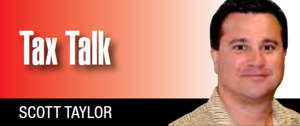With personal income tax-filing season over, it’s time to talk to your accountant or financial advisor about tax planning.
This is where your accountant earns his keep. There’s no shortage of people who can prepare a tax return, but a good accountant should easily pay for himself through good advice. Where do you start? Here are three things you and your tax advisor should consider when you talk about tax strategies.
Business structure
Is this the year to incorporate? Ask your accountant to compare how much personal income tax you paid in 2015 versus how much tax you would have paid had you incorporated. An important distinction will be the treatment of meals, and how, as an employee of your corporation, you could use the meal allowance and TL2 to reduce your tax obligation.
CRA’s decision that sole proprietor owner/operators had to use actual receipts and not logbooks to support their meal claims prompted many to trade a more complex filing process for the tax advantages of incorporation.
Some sole proprietors continue to use the simplified method to claim meals anyway and hope to not get caught. A meal claim of this size getting denied will surely lead to big reassessments.
Estimated income
People who don’t receive a regular paycheque with source deductions but still have income are required to pay income tax payments in installments.
If you’re a sole proprietor and your total taxes payable are more than $3,000 this year, or were more than $3,000 in either one of the two preceding tax years, your tax payments are due quarterly (on March 15, June 15, Sept. 15, and Dec. 15). If you are a corporation owing more than $3,000, your installments are due quarterly as well but the three-month cycle of payments is based on your year-end.
Sole proprietors must have paid enough tax by Dec. 31 to cover the amount they would otherwise have to pay on Apr. 30 of the following year. Corporations must have enough tax paid by their year-end. If you fall short, or instead send your taxes in at the end of the year in one lump sum, CRA will assess an interest penalty calculated against what they say you should have paid. The interest charge on the outstanding amount is compounded daily at the CRA’s prescribed interest rate. Furthermore, you can’t deduct it as you would interest
on any other business loan.
Any installment charges will be shown on your Notice of Assessment. You might have your 2015 Notice of Assessment already; review it to see just how much CRA has added to your tax bill. If you did not pay your taxes in full by April 30, then even more interest will be charged as you pay the balance over the coming months.
We advise our clients to apply their quarterly GST/HST refunds to their income tax installment payments. CRA can direct-deposit your GST/ HST refunds into a separate account from your business operations to make sure the money doesn’t get used for everyday activities. In the long run it will help with budgeting and business planning and save interest and penalty charges.
Changes in your life
Marriage, children, education expenses, an injury or illness – changes in your personal life can (and should) affect your tax plan.
For example, the disability tax credit is intended to help people with “severe and prolonged” physical or mental impairment offset their medical expenses.
Eligibility depends on an assessment of your condition by both a doctor and CRA. They will consider whether you are “markedly restricted” in terms of speaking, hearing, walking, eliminating (bowel or bladder), feeding, dressing, or performing mental functions of daily life.
To apply you must have your doctor complete Form 2201. Mail the form into CRA at any time during the year; do not wait. The CRA will assess your application and issue a Notice of Determination either approving or deny your eligibility.
It is really that easy. Please do not hire a service to help with this process. Unfortunately there are companies out there claiming the application process is complicated and will charge you a percentage of your refunds to assist you.
If you or a family member is coping with long-term illness or injury, talk to your accountant about DTC. Don’t rely on the word of someone who makes his living off your refund.
Scott Taylor is vice-president of TFS Group, providing accounting, bookkeeping, tax return preparation, and other business services for owner/operators.
Learn more at www.tfsgroup.com or call 800-461-5970.
